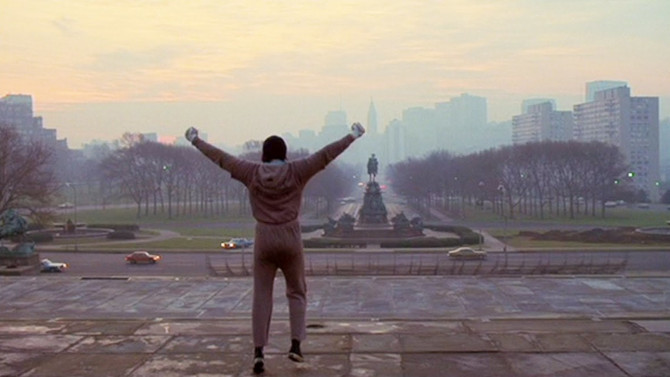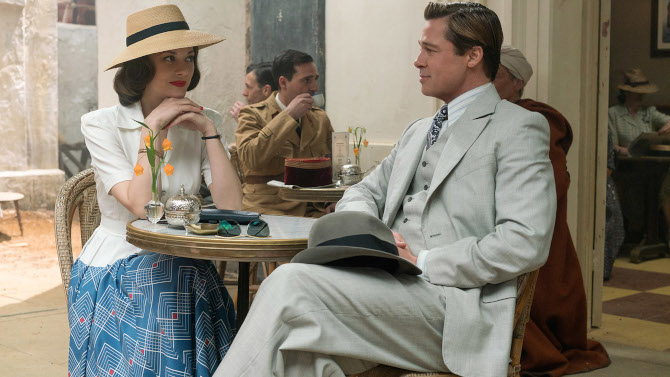
Déjà vu Dalliance
Channeling the mesmeric movies churned out by the studio system back in the 1930s and 40s, Allied (2016), directed by Robert Zemeckis, channels the likes of Morocco, Casablanca, Across the Pacific, Gilda, To Have and Have Not, and numerous others – attempting to find a spark from the classic themes of melodrama, romance, suspense and the epic nature of the annals of the cinematic past, with quite successful results. Set the year Casablanca and Across the Pacific were released – 1942, the story in fact starts in Morocco, with recently parachuted in Canadian spy Max Vatan (Brad Pitt) meeting up with another undercover agent, Marianne Beauséjour (Marion Cotillard), who will be pretending to be his wife.
-

Déjà vu Dalliance
AlliedFebruary 26, 2025Channeling the mesmeric movies churned out by the studio system back in the 1930s and 40s, Allied (2016), directed by Robert Zemeckis, channels the likes of Morocco, Casablanca, Across the Pacific, Gilda, To Have and Have Not, and numerous others – attempting to find a spark from the classic themes of melodrama, romance, suspense and the epic nature of the annals of the cinematic past, with quite successful results. Set the year Casablanca and Across the Pacific were released – 1942, the story in fact starts in Morocco, with recently parachuted in Canadian spy Max Vatan (Brad Pitt) meeting up with another undercover agent, Marianne Beauséjour (Marion Cotillard), who will be pretending to be his wife.
-

What Could Have Been: Shopworn
February 10, 2025It’s usually hard to bet against Barbara Stanwyck. Starting her career in the late 1920s, within a few years she was already churning out star making roles as plucky working class girls who could rise to the top: think Ten Cents a Dance (1931) and Baby Face (1933) – both reviewed here on Filmizon, only to further elevate herself during the film noir era with starring roles like Double Indemnity (1944) and The Strange Love of Martha Ivers (1946) – also both on Filmizon, she even conquered television later in her career as matriarch Victoria Barkley in 112 episodes of Big Valley from the mid to late 1960s. In other words, it’s rather unusual to see her in a clunker... though with the film looked at here today, Shopworn (1932), directed by Nick Grinde, Stanwyck herself described it as, “one of those terrible pictures they sandwiched in when you started”.
-
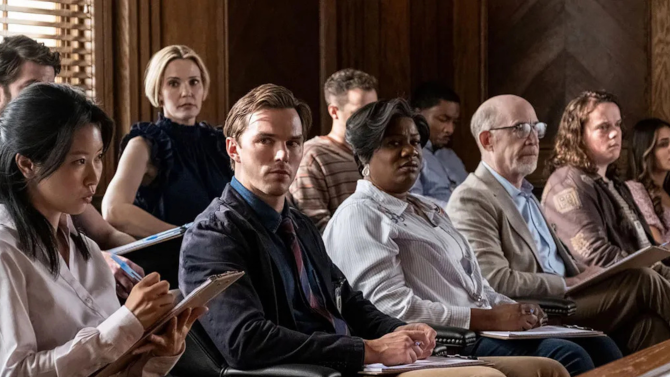
Judge, Juror #2, and Executioner
Juror #2January 6, 2025This very well may be the shortest review I’ve ever written. Juror #2 (2024), Clint Eastwood’s most recent directorial effort (he also co-produces), very much leans on several legal dramas and thrillers from the past, most notably the classic 12 Angry Men, to great effect. Twisting the above mentioned film in clever fashion, in some ways, recovering alcoholic Justin Kemp (Nicholas Hoult) is a stand-in for Henry Fonda’s Juror #8, as he too stands up for the man being charged with murder... the only difference is, he soon realizes that he knows a bit more about the case than the rest of the jurors (and even he originally thought). Though this is not a twist filled feature (à la Usual Suspects), much of its entertainment comes from watching it unfurl as it goes along – hence why very little of the plot will be disclosed here. It is also worth noting that, unlike 12 Angry Men, screenwriter Jonathan A. Abrams opens the story wide, allowing us to hear testimony, explore the crime scene, and discover actual truths we never got to see in the 1957 motion picture.
-
Star Pick with Kurt Angle
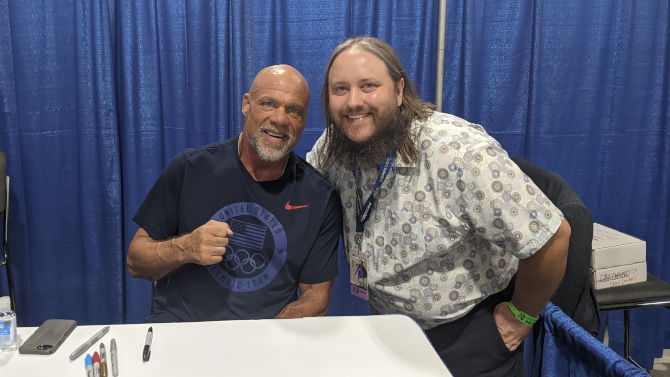 The Right AngleRockyJanuary 1, 2025
The Right AngleRockyJanuary 1, 2025It was an absolute pleasure to meet and get a quick interview with the great Kurt Angle this past summer in Ottawa. First making a name for himself on the amateur wrestling circuit, it all culminated with a gold medal win (with a broken neck, no less) at the 1996 Summer Olympics held in Atlanta, Georgia. The ultimate achievement for most amateur athletes, this was not the end for Angle, but only the beginning. Just a mere two years later, he had signed on to the World Wrestling Federation (now the WWE or World Wresting Entertainment), a leap that would soon find him taking professional wrestling by storm. Making his television debut in November of 1999, he was a natural, not only at the wrestling, but also on the mike.
-
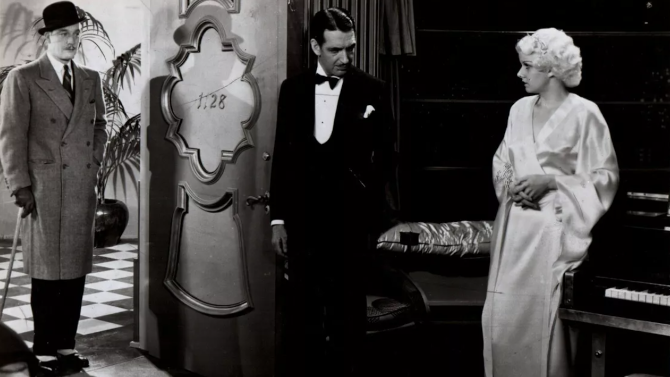
Wise Gals
Three Wise GirlsSeptember 13, 2024It’s funny how things have changed so much over the years, but at the same time, human beings seem to have changed so little. Single men complain about women, while single women complain about men just as much... something discussed quite frequently in the romantic dramedy Three Wise Girls (1932), directed by William Beaudine and based upon Wilson Collison’s novel “Blonde Baby”. Cassie Barnes (Jean Harlow) is a small town soda jerk... and with her shapely body and platinum blonde locks, she attracts all the wrong kinds of men. Having had enough of the lecherous men back home, she makes the move to New York City, quickly finding work (and a whole new crop of creeps) while working the ice cream and soft drink game.
-
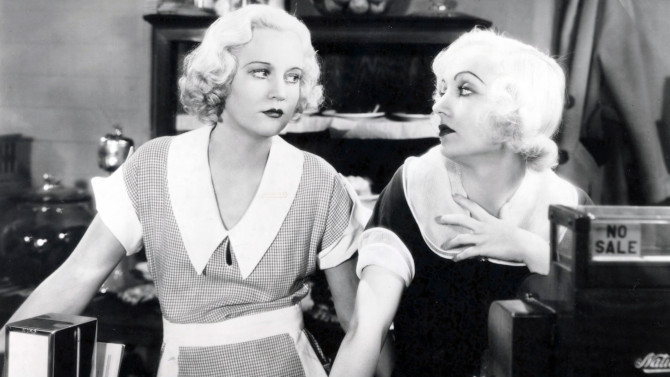
Virtue Signaling
VirtueDecember 18, 2023A Pre-Code romantic crime drama from Columbia Pictures, 1932's Virtue, directed by Edward Buzzell, got off to a bit of a bumpy start... for when star Carole Lombard (on loan from Paramount) met studio president Harry Cohn (known to be blunt, opinionated, and rather colourful with his language), he told her that her hair was too white – making her look like ‘a whore’. Lombard, no shrinking violet, promptly responded with: “if anyone would know a whore it would be you”. Though the two would soon earn each other’s respect (something that would last for the rest of their lives), this really is a perfect story that exemplifies the edgy themes and style found in these Pre-Code movies. Opening with a black screen that hides the visuals of a criminal sentence, a Judge rather kindly orders several prostitutes to vacate the city, but if they return, they shall be punished to the full extent of the law.

